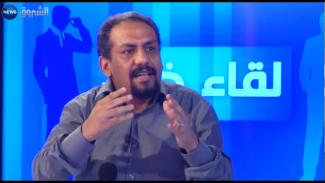
Algiers, June 19, 2024 (SPS) - The President of Collective of the Sahrawi Human Rights Defenders "CODESA", Ali Salem Tamek, confirmed that the human rights situation in Western Sahara is getting worse, warning against any slide that the situation may witness due to the Moroccan occupation's impunity and accountability and its persistence in its systematic criminal practices, in light of the "inability" of the international community to impose the application of international legitimacy in Western Sahara.
In an interview with Algerian Press Service “APS”, Ali Salem Tamek sounded the alarm about the reality of human rights in the occupied territory "due to the security, military and media siege imposed by the Moroccan occupation and its categorical refusal to allow international fact-finding teams to enter the territory, which provides it with cover to continue committing crimes of genocide and crimes against humanity away from the spotlight, and thus legitimizing its occupation of Western Sahara."
He considered that the failure to expand the mandate of the UN MINURSO mission to include human rights monitoring, the inability of the international community to enforce international legitimacy in Western Sahara, and its failure to pressure the Moroccan occupation force to enforce respect for the Sahrawi people's right to self-determination "are among the most important factors that contributed to the deterioration of the human rights situation in the occupied Sahrawi cities."
The Sahrawi human rights activist highlighted the "systematic nature" of war crimes, genocide, forced displacement, deliberate eviction, confiscation of civilian property, suppression of rights, and restrictions on public freedoms, among others, but “the most dangerous", he said, "is the Moroccan occupation's targeting of civilian groups, which is prohibited by international humanitarian law and relevant agreements during conflicts," noting the increase in the crimes committed by the Moroccan occupation "in a striking manner after the resumption of armed struggle by the Polisario and the renewal of military confrontations on November 13, 2020," based on a report prepared by "CODESA" on the human rights situation 2021/2022.
Regarding the role of Sahrawi civil society organizations in exposing the crimes of the Moroccan occupation in Western Sahara, the former political prisoner said that his organization works to "document and expose these atrocities committed on a large scale" and to inform international human rights and humanitarian organizations about them, "despite the obstacles and restrictions imposed by the occupier, which have reached the point of threatening to harm the personal safety of human rights activists and targeting their families and livelihoods to force them to submit to its colonial policy" that ignores the fact that Western Sahara and Morocco are "two separate territories", recalling the legal nature of the conflict in Western Sahara as a "decolonization issue" in the last colony in Africa.
During his talk about the situation of Sahrawi prisoners in Moroccan prisons, Tamek did not hide his concern about this "thorny" issue, which he considers "a fundamental issue for the Sahrawi people as a whole," noting that "these prisoners were arrested because of their political opinions, which they advocated and fought for in a peaceful manner in defense of their right to self-determination and to protect their country's wealth from the systematic looting of the Moroccan occupation." He also denounced the "inhumane" conditions of detention and imprisonment in which the most heinous violations of their rights are practiced and they are subjected to unfair and sham trials that have reached the point of life imprisonment."
In addition, Tamek again appealed to international human rights organizations and the African and European Unions to work to force Morocco to respect international legitimacy and the right of the Sahrawi people to self-determination and sovereignty over their natural resources and to protect them from the tyranny of the Moroccan occupation. He also called on the Security Council to provide protection to the Sahrawi people who are subjected to serious human rights violations at the hands of the Moroccan occupation forces.
In conclusion, the head of the CODESA praised Algeria's "historical and steadfast" position on the Sahrawi issue, "which is consistent with its historical legacy of struggle in supporting and championing just causes and with its humanitarian principles in determining the fate of peoples across the world," stressing that "history will witness Algeria's role and support for the oppressed peoples, foremost among them the Sahrawi and Palestinian peoples."
SPS